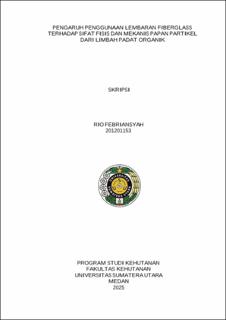| dc.description.abstract | Bamboo is a type of grass plant with cavities and segments in its stem. One of the specialties of bamboo is that it is the fastest growing plant in the world. The high growth rate makes bamboo very easy to find in every region. Durian fruit skin contains about 50-60% cellulose, 5% lignin and 5% starch of the fruit weight. The cellulose content of durian fruit skin is quite high, which is 50-60% of the fruit weight. Mahogany is a type of tree that sheds leaves in the dry season, its height can reach 35 meters. Mahogany leaves as a material containing lignocellulose can be used as raw material for making particle boards. Fiberglass is most often used in composite materials because of its reinforcing or strengthening properties. The weakness of fiberglass is that it is easy to crack and break, because the hardness of the fiberglass surface is too high, so that the propagation process is accelerated even with small defects or loads. The purpose of the study was to evaluate the physical and mechanical properties, as well as microscopic particleboard from the main organic waste materials in the form of bamboo leaves, durian skin, mahogany litter, bamboo shavings and a mixture of fiberglass. Testing of the physical and mechanical properties of particleboard refers to the JIS A 5908 (2003) test standard. The particleboard produced has the best properties, namely particleboard with type B board, namely a board with a density of 0.72 g/cm3; water absorption value of 44.16%; thickness expansion of 4.84%; MOR 266 kgf/cm2; MOE 20,447 kgf/cm2; and IB 2.15 kgf/cm2. The physical properties of particleboard against the parameters of density, water content, and thickness expansion have met the requirements of the JIS A 5908 (2003) standard and in the mechanical properties test, namely the parameters of MOE, MOR and IB all have met the requirements of the test standard. | en_US |


